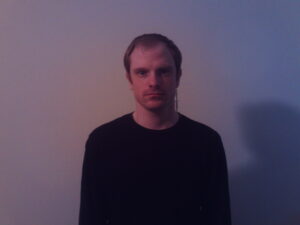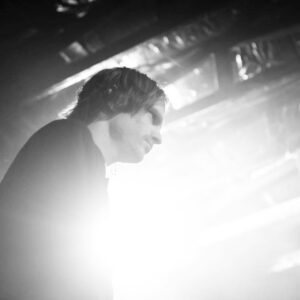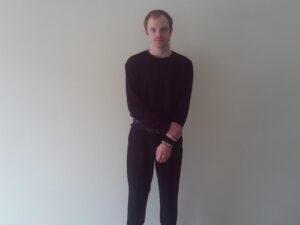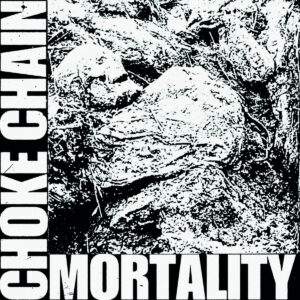With only three EPs released, Choke Chain is already considered one of the names to follow of the EBM/dark electro scene. In those works, he has managed to transmit the anguish and problematics of modern society, as he delivers a raw and direct music. He is releasing his first full album on the 22nd of September, entitled Mortality. Choke Chain is also coming to Europe for a tour that will stop at Praga, Budapest, Munich, Paris and Berlin among other cities.
 —Why did you choose a name like Choke Chain for your project? Did you want to give a sense of oppression/anguish?
—Why did you choose a name like Choke Chain for your project? Did you want to give a sense of oppression/anguish?
—I guess so, I am a very anxious person and one of my symptoms is feeling like I can’t breathe or as if I am choking. A lot of my music has to do with my anxieties so I felt like it fit.
—You are a follower of punk and hardcore and you have confessed that bands like Rudimentary Peni, Wasted Youth or Sacrilege have influenced your work. What inspires you from this genre: the rawness, the aggressiveness…?
—For sure the rawness of the production style. I try to pay homage to punk in a way by always making sure to keep my music as raw as possible. I’m a big fan of music that feels very real and visceral, and the production can play a big part in that.
My vocal style is very influenced by punk bands, specifically by acts like Rudimentary Peni and Dystopia, both bands that capture the same sort of anxious, distressed sound that I aim for. Also, the political aspect of punk is something that I try and bring into my music from time to time, as the anxieties I deal with are caused by the people in power. Governments across the world are only in it for themselves, to preserve their own power, and they will go to any length to maintain it, its insanity.
—When did you got into industrial/EBM? How did you do the transition from punk to industrial?
—I’ve sort of always been aware of industrial in general from an early age as well as punk. My older brother played in both goth and punk bands as I was growing up and was constantly introducing me to new music. I discovered Skinny Puppy in 2011 or so and quickly fell in love with them, and then saw them in 2014 with Youth Code. Seeing Youth Code was incredibly eye opening to me, seeing that punks were making old school industrial. As far as the transition from playing in punk bands to doing industrial music, it was very natural to me. The way I think of Choke Chain is that I’m just doing punk with synthesizers.
—You said that one of your main influences is mid-90s Front Line Assambly and records like Caustic Grip o Tactical Neural Implant. What have you learned from these albums?
—I’m very influenced by FLA’s sampling style, the sort of erratic way they would incorporate samples into their music. Also, they kind of gave me a template as to what an EBM record should sound like I guess, Caustic Grip is a very intense and energetic record, and Tactical Neural Implant has some slower elements in some of the songs that have inspired me. I was actually able to tour with them a year or so ago on a leg of their 2022 US tour, which was incredible. I never in my life thought this music would enable me to tour with one of my biggest influences in industrial music
—You have named Spike Hellis as a band that motivates you. As we should try to interview them in the near future, can you please tell us what do you find interesting in their music?
—Before I even mention their music, I want to stress how great they are as human beings. They truly care about making connections with people just for the sake of it, not to further some sort of goal or image. I’m the same way, and when we met I think we mutually sensed that from each other. I’ve had some really good times with them and they have also been there for me when I needed friends and that is something so important that people don’t do enough. Compared to punk, the modern dark music scene is incredibly narcissistic and egotistical, and it is very depressing. Meeting Spike sort of restored my faith in the scene, and I love both of them dearly.
As for their music, I really find the way that they use tension and anxiety in their music interesting, because it is in a different way than I use both of those things. Their music is more dynamic than mine and they know how to use restraint in their compositions very well, which makes everything feel sort of unnerving.
—Your first single Chain Tactics, has a very classic EBM sound. What kind of gear do you use? Do you want a retro analogue sound for your music?
—My first record is definitely my most stripped down, for sure. The style of that record is something I’ve always been working to refine. The minimal style of that record is kind of the basis for all of my other stuff.
For gear I currently use an MPC Live, Elektron Digitone, Waldorf Blofeld, Behringer MS-1, Behringer Neutron, Behringer Pro-1, Roland D-110, Korg Volca FM, and various synth plugins. Yes, I suppose I want to keep a retro sound, everything in my songs is run through a sampler before it gets recorded to give it added grittiness and bite.
 —The artwork of your releases reminds me of early industrial stuff from the late seventies. Do you want the keep the DIY philosophy that was inherent also to punk?
—The artwork of your releases reminds me of early industrial stuff from the late seventies. Do you want the keep the DIY philosophy that was inherent also to punk?
—Absolutely. A lot of aspects of my work are still DIY, and being involved with DIY has taught me a lot about myself and about life, it’s made me who I am. There’s no way I could turn my back on it, some aspect of my work will always be DIY no matter what.
—Where do you find inspiration for your lyrics? Do you prefer to focus on more personal things or social problems?
—My inspiration comes from real life, which in many ways is objectively awful. I don’t pretend like it isn’t. I try to not hold back and be very blunt in my lyrics. I feel like people need to hear some of these things so they stop being fucking terrible to other people and themselves. The vast majority of the population of our planet are very unkind and uncaring, which causes most of the issues we face.
My lyrics are often my emotional reactions to social problems. Different from punk in the way that a punk band might just write about the problems themselves more directly, I write about how those things make me feel personally.
—Does music work for you as a way of escaping from reality or diary problems? You talk a lot about anxiety, is music your way of escaping it?
—My music is not an escape from anything. I can’t escape my anxieties, it’s awful. My music at least gives me an outlet to talk about it, its pure catharsis.
—You said that you want to sound like a horror movie soundtrack, really scary. Do you think that you manage to do that with Invoking Shadows?
—Partially, yes. On that record, I was still sort of finding that sound, as with my previous records before that.
—How do you think your music has evolved in these years? When you hear the tracks in your compilation The EPs of CC, how do you see the evolution?
—My music has become less minimal, and I’ve tried to incorporate more Electro-Industrial and Dark Electro influence. Over the years I’ve realised that instead of just a strict EBM project, it was my destiny to have a lot of 90’s Dark Electro and Electro-Industrial sounding stuff as well. I feel like as the years have gone on I’ve gotten better at combining all three.
—There is a lot of pain in your vocals. Is it difficult for you to channel with those feelings when you play live?
—No, because I am in pain in certain ways.
—You have also collaborated on a track with The Gothsicles, right?
—Yes! I did a track with Brian. If you know anything about The Gothsicles, you know it’s completely different from my own work, very light hearted and fun. Our vocal styles are sort of similar, so he thought I would make a great guest vocalist on a track. It was sort of out of my comfort zone to do something like what we did, but I’m glad I did it. We are good friends and he is originally from Wisconsin, where I am based, so it felt like a good fit for a collaboration. We have performed it live only once, but I’m sure that we will do it again.
—What can you advance us of your fore-coming album Mortality?
—It’s my best work by far, definitely the most intense stuff I’ve written. It’s what I always knew I would be able to write eventually.
—You are coming to Europe on a tour with Odonis Odonis to promote the album. Sadly, there is no Spanish date, but what can the public expect of your performances?
—I’ll be playing my new album in full for my set! Maybe I’ll have one or two old songs in there since I haven’t played any of my songs in Europe.



